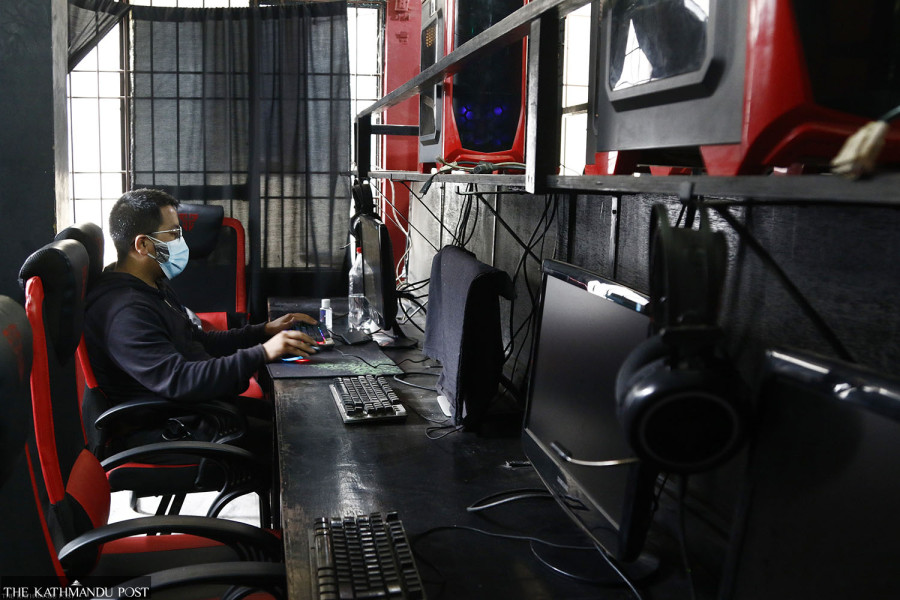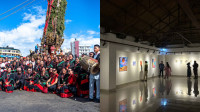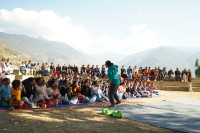Culture & Lifestyle
Decline of gaming cafe culture in Nepal
Gaming cafes still receive a respectable amount of gamers but that is just a smouldering remnant of the once vibrant and active gaming cafe culture.
Shranup Tandukar
In the heart of Jhamsikhel, surrounded by the bright neon lights of bars and cafes and hidden behind a convenience store and a restaurant sits Amol Cyber, one of the oldest gaming cafes in Nepal. The cafe was once a staple name among gamers from Lalitpur to Kathmandu.
“I started this business in 2001. Back then, it wasn’t a cyber but a gift shop and a video-rental place and I had only one computer,” says Ram Krishna Magar, owner of Amol Cyber. “Back in 2001, computers or access to the internet wasn’t as common as it is today. I saw a business opportunity and within six months of opening my gift shop and video-rental place, I added four more computers. By 2010, in my neighbourhood alone, there were around eight to nine gaming cafes. Today, all of them have already shut down and we are the only gaming cafe still operating.”
Two decades after opening its doors, Amol Cyber now stands as a hollow shell of its former self, a testament to the thriving gaming cafe culture of the past. There are still rows upon rows of computers, and the gaming cafe still welcomes a small crowd of gamers every day. However, among the 40 or so computers, only 15 are in working condition. And even from the working computers, frequent slangs and insults can be heard from the gamers as some of the Personal Computers (PCs) freeze and stutter unexpectedly between intense in-game team fights.
Until a few years ago, gaming cafes were a lucrative business in the Kathmandu Valley. There were dozens of cafes and young people would throng these cafes from the mornings to late evenings. Between 2006 to 2016, when Nepal was seeing upto 16 hours of power cuts daily, Amol Cyber was thriving because it was one of the few cafes that had a fuel-operated electricity generator.
“During the cafe’s peak business years, there would be crowds of kids behind each computer, eagerly waiting for their turn,” says Magar.
As gaming PCs started becoming more affordable, the internet connectivity becoming more accessible, hours of load-shedding started getting phased out, and more and more gamers started getting their own PCs and internet connection, gaming cafe culture slowly started losing relevance.
The Covid-19 pandemic and subsequent lockdowns further aggravated the already crumbling gaming cafe culture, forcing many gaming cafes to shut down for good. The few remaining gaming cafes still receive a respectable amount of gamers but that is just a remnant of the once vibrant and active gaming cafe culture. As casual gamers retreat into the confines of their own homes, many gaming cafe owners are diversifying into other businesses.
Bikesh Shrestha, a veteran esports player says that the peak point of gaming cafe culture was from 2008 to 2009. He shares that during that time, gamers would still come to the gaming cafe even if they had their own PCs at home. “Gaming cafes didn’t just provide access to computers for gamers. They were also a place where gamers could play and have fun together with their friends,” says Shrestha.
Magar also asserts that the sense of community provided by gaming cafes was one of its main selling points. “But as more and more gamers got internet and PCs at home and games started to go online from single-player and LAN multiplayer, the gamers could use voice chat in online games to recreate that same community feeling online,” says Magar dishearteningly.
When PC esports gaming started gaining popularity in Nepal in 2018, the Valley’s few remaining gaming cafes found themselves suddenly becoming relevant, providing these businesses with a lifeline. For competitive PC esports players, the optimal environment for growth is a boot camp—a space where gamers could practice, live, and play together—which is expensive. Gaming cafes became a cheaper alternative where gamers could practice together with their team members at an affordable rate, without needing to rent out their own floor or a whole house.
“When common people have a dispute, they say ‘I will see you in court’, whereas when gamers have a dispute, they say ‘I will see you in LAN[gaming cafe or tournament stage],” says Dipesh Tuladhar, owner of PowerPlay, a gaming cafe in Bhotahiti which opened in 2009. He shares that his gaming cafe would be fully booked during the day for weeks before local, national, and international tournaments by teams for their practice sessions. However, this resurgence in game cafe culture was nothing in comparison to the days of loadshedding during which Tuladhar says that “his gaming cafe would be packed literally 24 hours a day.”
Gaming cafes and esports have a symbiotic relationship; gaming cafes provide a safe haven for hopeful players and teams to play and practice together while a thriving esports scene births a new hopeful gamer each new day.
Tuladhar says that the PC esports scene in Nepal started to develop rapidly after Nepal Esports Association(NESA) hosted the first national esports competition in 2018. He says that in 2019, there were four major national competitions for PC games such as Counter-Strike Global Offensive (CS:GO) and Dota 2 which showed a glimmer of a potential career path for PC gamers. As gamers started to become serious about competitive gaming, they started to swarm gaming cafes.
However, the pandemic and subsequent lockdowns meant that gaming cafes were forced to close and national and international tournaments were cancelled. Tuladhar shares that during lockdown with no other alternative, he even loaned his gaming cafe computers to regulars to take home so that he could collect a small revenue. His gaming cafe was one of the few fortunate ones to survive the brutal lockdowns.
If there is a common thing among most existing gaming cafes in the Valley, they are all, Amol Cyber included, located in their owner’s own homes.
“The gaming cafes which have closed down after 2020 probably did due to not being able to pay rent,” says Tuladhar, whose PowerPlay is also situated on one of the floors of his own home. “After all, which gaming cafe can keep paying rent when there are literally no customers for months on end?”
Nirmal Limbu shares that he was forced to close his Kumaripati branch of Cloud 9 gaming cafe as he couldn’t bear the rent fees during the lockdowns and he shifted this branch to Ason instead, where he has to pay less rent. The Nakhipot branch of his gaming cafe, which was opened in 2017, meanwhile is located in his relative’s house where he says that “late rent can be negotiated easily.”
But even a rent-free provision may not be enough to sustain a gaming cafe in the coming future. Gaming cafe owners are diversifying into other business ventures while some gaming cafes themselves offer additional services.
Amol Cyber acts as a Western Union agent location and also provides photocopy and printing services to supplement its income from the gaming cafe. Meanwhile, Tuladhar says that he is looking to invest in other business ventures to complement his income. He is one of the founding members of WASD Arena, an online gaming platform. Through WASD Arena, he also sells gaming peripherals such as keyboards, mouses, graphics cards and so on.
For Limbu, the gaming cafe has been a passion project. “I have been involved in the IT sector for a long time. Even now, my primary source of income is the IT sector while my gaming cafe is secondary,” says Limbu. He adds, “In this environment, no gaming cafe owner can realistically hope to achieve a compounding income from gaming cafes.”
Game Planet, a gaming cafe in Kalimati that reopened recently after the second lockdown, has been seeing only a handful of visitors. The cafe started operations in 2005. “College students made up a majority of my customer base. But now that colleges have remained shut down, there aren’t many people here,” says Kabil Byanjankar, the owner. “I was thinking of getting a corporate 9-5 job somewhere but that’s not feasible. There’s no one else to look after my gaming cafe besides me.”
The cafe’s computer rooms look desolate and dreary. There are hardly five gamers at a time but the main server room looks warm and bright, adorned with trophies and mementoes from tournaments won by teams sponsored by Game Planet.
“I never intended to achieve commercial success by opening a gaming cafe. I believe that Nepali gamers are as skilled as their international counterparts. I just hope that Nepal's esports scene can develop and make a name for itself on the international stage soon,” says Byanjankar with hopeful eyes as giant trophies gleam behind his back.




 23.11°C Kathmandu
23.11°C Kathmandu















